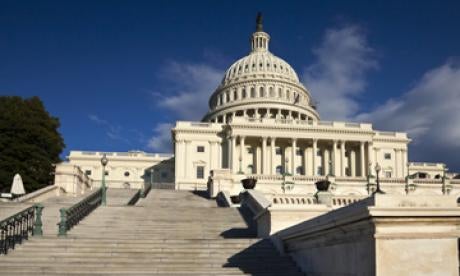Legislative Activity
House Committee on Energy and Commerce Subcommittee on Health to Mark Up Seven Bills
On Tuesday, November 3, and Wednesday, November 4, the House Committee on Energy and Commerce Subcommittee on Health will hold a markup to consider seven pieces of legislation: H.R. 2017, the Common Sense Nutrition Disclosure Act of 2015, and an amendment in the nature of a substitute to H.R. 2017, which amends the Federal Food, Drug, and Cosmetic Act to address certain disclosure requirements for food establishments; H.R. 2446, to amend title XIX of the Social Security Act to require the use of electronic visit verification for personal care services furnished under the Medicaid program, and an amendment in the nature of a substitute to H.R. 2446; H.R. 2646, the Helping Families in Mental Health Crisis Act, which offers psychiatric, psychological, and supportive services for individuals with mental illness; H.R. 3014, the Medical Controlled Substances Transportation Act, which authorizes providers to transport controlled substances from practice setting to practice setting or a disaster area, pursuant to an agreement with the Attorney General; H.R. 3537, the Synthetic Drug Control Act of 2015, which details how controlled substance analogues are to be regulated; H.R. 3716, the Ensuring Terminated Providers are Removed from Medicaid and CHIP Act, which requires states to provide the Secretary of the Department of Health and Human Services information on provider terminations; and H.R. 3821, the Medicaid Directory of Caregivers (DOC) Act, which, in the case of states providing care on a fee-for-service basis or through a primary care case-management system, requires the publication of a provider directory.
This Week’s Hearings:
-
Tuesday, November 3: The House Committee on Energy and Commerce Subcommittee on Health will hold a hearing titled “Examining Legislation to Improve Medicare and Medicaid.”
-
Tuesday, November 3: The House Committee on Ways and Means Subcommittee on Health will hold a hearing titled “The State of Obamacare’s CO-OP Program.”
-
Tuesday, November 3: The House Committee on Energy and Commerce Subcommittee on Health will hold a markup to consider health-related legislation.
-
Wednesday, November 4: The House Committee on Energy and Commerce Subcommittee on Health will continue its markup of health-related legislation.
-
Thursday, November 5: The House Committee on Energy and Commerce Subcommittee on Oversight and Investigations will hold a hearing titled “Examining the Costly Failures of Obamacare’s CO-OP Insurance Loans.”
Regulatory Activity
HHS Waives Fraud and Abuse Laws in Shared Savings Program
On Wednesday, October 28, the Centers for Medicare and Medicaid Services (CMS) and the Department of Health and Human Services Office of Inspection General (HHS-OIG) issued a final rule titled “Medicare Program; Final Waivers in Connection with the Shared Savings Program.” This rule finalizes waivers in the Medicare Shared Savings Program of certain fraud and abuse laws, including provisions of the physician self-referral law, the federal anti-kickback statute, and the beneficiary inducements civil monetary penalties law. These laws restrict certain financial arrangements between hospitals, physicians, and other parties to prevent issues associated with payments connected to referrals. As the Shared Savings Program developed, however, stakeholders expressed concerns that these restrictions may inhibit the intended development of shared savings arrangements and care coordination.
CMS Proposes Hospital Discharge Planning Requirements
On Thursday, October 29, CMS issued a proposed rule titled “Medicare and Medicaid Programs; Revisions to Requirements for Discharge Planning for Hospitals, Critical Access Hospitals, and Home Health Agencies.” This proposed rule would revise the discharge planning requirements for hospitals, including long-term care hospitals, inpatient rehabilitation facilities, critical access hospitals, and home health agencies that participate in the Medicare and Medicaid programs. Of note, hospitals would be required to develop and implement a discharge planning process within 24 hours of admission or registration of inpatient and certain types of outpatient beneficiaries.
This rule is scheduled for publication in the Federal Register on Tuesday, November 3. A 60 day comment period will run thereafter.
CMS Establishes Methods for Assuring Access to Covered Medicaid Services
On Thursday, October 29, CMS released a final rule titled “Medicaid Program; Methods for Assuring Access to Covered Medicaid Services.” This rule requires states to review data and trends in the Medicaid program to evaluate access to care for covered services. Additionally, states must obtain public input on the adequacy of access to care to covered services in the Medicaid program. If shortcomings are discovered, states must take corrective action.
In coordination with this final rule, CMS on the same day published a request for information titled “Medicaid Program; Request for Information (RFI) – Data Metrics and Alterative Processes for Access to Care in the Medicaid Program.” This RFI solicits feedback from stakeholders on the access to care measures and metrics, which would be useful to CMS and states in ensuring access to care for Medicaid beneficiaries. Stakeholders will have 60 days to submit comments.
Two-Midnight Rule Revisions Finalized
On Thursday, October 29, and Friday, October 30, CMS finalized the FY 2016 policies and rates for the following payment systems: home health prospective payment system (PPS); hospital outpatient PPS; hospital inpatient PPS; ambulatory surgical center payment system; physician fee schedule; and end-stage renal disease PPS.
As anticipated, CMS revised the two-midnight rule in its final rule titled “Medicare Program: Hospital Outpatient Prospective Payment and Ambulatory Surgical Payment Systems and Quality Reporting Programs; Short Inpatient Hospital Stays; Transition for Certain Medicare-Dependent, Small Rural Hospitals Under the Hospital Inpatient Prospective Payment System; Provider Administrative Appeals and Judicial Review.” This rule expands the “rare and unusual” exceptions policy to allow for Medicare Part A payment on a case-by-case basis for inpatient admissions that do not currently satisfy the two-midnight benchmark. Additionally, this rule revises the medical review strategy to have Quality Improvement Organization (QIO) contractors conduct reviews of short inpatient stays rather than Medicare Administrative Contractors (MACs).




 i
i


